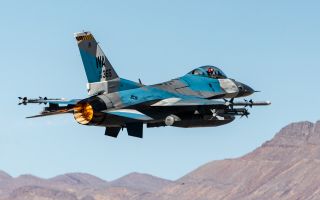Drone wars are here – but Ukraine may not be the best model for what comes next
Ukraine's drone war has transformed how militaries think about combat – but Western forces should be careful not to assume this is the blueprint for future conflicts, a leading security expert has warned.
As part of the UK's Strategic Defence Review, the government has pledged £4bn for drones and autonomous systems, with a new UAV centre set to drive rapid development across all three services.
But the technology cycle is moving so fast that experts say flexibility, not hardware, is key.
Dr Ulrike Franke, a senior policy fellow at the European Council on Foreign Relations, said it would be a mistake to treat Ukraine as a preview of tomorrow's wars.
"It's kind of interesting because we still look at Ukraine, and I get asked this a lot, is Ukraine the future of warfare? And we need to realise that Ukraine, in a way, it's already the last war," she said.
She argued that terrain, actors and available technology make Ukraine a unique case.
"We can't just take Ukraine and say, 'oh, this is the future of warfare'," she said, warning that future conflicts may look very different.
"The important thing is just to not get too much wrong… and be as flexible as possible."
Innovation on the battlefield now moves faster than traditional procurement cycles.
While Ukraine has fielded everything from jet-powered drones to fibre optic-guided systems, Dr Franke said militaries shouldn't focus on individual platforms.
"We shouldn't be concentrating so much on specific systems... that's all part of the innovation cycle," she said. "And that could already be made obsolete or largely obsolete tomorrow."
Instead, she called for "an acquisition process that allows for a lot of speed ... and a lot of modularity," so production lines can be rapidly adapted.
That, she said, requires better cooperation between the MOD, industry and the Armed Forces.
The UK, like other Western nations, remains heavily reliant on Chinese-made drone components.
The company DJI alone produces around two-thirds of the world's consumer drones, and Dr Franke said that presents a major vulnerability.
"Imagine a future war in which China may not be an indirect supporter, but a direct supporter of the other side," she said.
“They could basically cut off production and delivery of these parts."
While efforts are underway to build up domestic production, she warned: "We need to realise that this really is needed… because scaling up production massively... that's going to be much harder. So we need to do it now."
The Strategic Defence Review sets out plans to prepare the UK for war-fighting readiness, but what that looks like could shift dramatically in just a few years.
For planners and policymakers, the biggest challenge may not be building the next killer drone, but staying agile enough to fight with or against whatever comes next.









